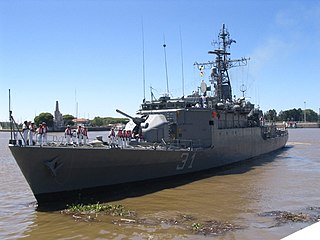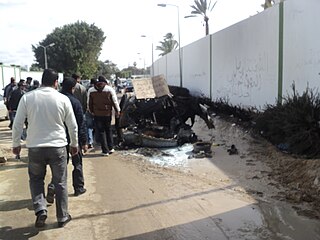
The member states of the United Nations comprise 193 sovereign states. The United Nations (UN) is the world's largest intergovernmental organization. All members have equal representation in the UN General Assembly.

The United Nations Truce Supervision Organization (UNTSO) is an organization founded on 29 May 1948 for peacekeeping in the Middle East. Established amidst the 1948 Arab–Israeli War, its primary task was initially to provide the military command structure to the peacekeeping forces in the Middle East to enable the peacekeepers to observe and maintain the ceasefire, and in assisting the parties to the Armistice Agreements in the supervision of the application and observance of the terms of those Agreements. The organization's structure and role has evolved over time as a result of the various conflicts in the region and at times UNTSO personnel have been used to rapidly deploy to other areas of the Middle East in support of other United Nations operations. The command structure of the UNTSO was maintained to cover the later peacekeeping organisations of the United Nations Disengagement Observer Force (UNDOF) and the United Nations Interim Force in Lebanon (UNIFIL) to which UNTSO continues to provide military observers.
A United Nations General Assembly resolution is a decision or declaration voted on by all member states of the United Nations in the General Assembly.
The Military Staff Committee (MSC) is the United Nations Security Council subsidiary body whose role, as defined by the United Nations Charter, is to plan UN military operations and assist in the regulation of armaments. Although the Military Staff Committee continues to exist, negotiation efforts between the United States, the Soviet Union and other nations in the late 1940s failed, and the committee has since been largely defunct, only serving in an advisory capacity.
The United Nations Atomic Energy Commission (UNAEC) was founded on 24 January 1946 by the very first resolution of the United Nations General Assembly "to deal with the problems raised by the discovery of atomic energy."
Chapter VII of the United Nations Charter sets out the UN Security Council's powers to maintain peace. It allows the Council to "determine the existence of any threat to the peace, breach of the peace, or act of aggression" and to take military and nonmilitary action to "restore international peace and security".
The United Nations Commission on Conventional Armaments was founded as a result of the founding United Nations treaty in 1946. The goal of the commission was to find ways to reduce the size of non-nuclear armaments around the world. The Commission was formally established by the Security Council Resolution on 13 February 1947. The five permanent members of the United Nation Security Council could not agree on how to achieve this aim and so the first report of the Commission in 1949 made no substantial recommendations.

United Nations Security Council Resolution 23 was adopted on 18 April 1947. The Council established a subsidiary group to assist the commission investigating the alleged border violations between Greece and Albania, Bulgaria, and Yugoslavia formed by Resolution 15.
United Nations Security Council Resolution 27 was adopted on 1 August 1947. The Council called for a ceasefire and a peaceful resolution between the parties from the Netherlands and Indonesia involved in the Indonesian National Revolution.
United Nations Security Council Resolution 68, adopted on February 10, 1949, resolved that the United Nations General Assembly Resolution 192 be transmitted to the Commission for Conventional Armaments for action according to its terms.
United Nations Security Council Resolution 77, adopted on 11 October 1949, having received and examined the second progress report of the Commission for Conventional Armaments, the Council directed the Secretary-General to transmit the report, along with its annexes, accompanying resolution and a record of the Council’s consideration of the subject to the General Assembly for its information.
United Nations Security Council Resolution 78, adopted on October 18, 1949, having received and examined the proposals contained in the working document on the implementation of United Nations General Assembly Resolution 192, adopted by the United Nations Commission on Conventional Armaments the Council requested the Secretary-General transmit these proposals and the records of the discussion on this question in the Council and the Commission for Conventional Armaments to the General Assembly.
United Nations Security Council Resolution 79, adopted on January 17, 1950, having received and the text of United Nations General Assembly Resolution 300 concerning the regulation and general reduction of conventional armaments and armed forces, the Council decided to transmit the resolution to the Commission for Conventional Armaments for further study in accordance with the Commission’s plan of work.

United Nations Security Council Resolution 418, adopted unanimously on 4 November 1977, imposed a mandatory arms embargo against South Africa. This resolution differed from the earlier Resolution 282, which was only voluntary. The embargo was subsequently tightened and extended by Resolution 591.

United Nations Security Council resolution 724, adopted unanimously on 15 December 1991, after reaffirming resolutions 713 (1991) and 721 (1991) and noting a report by the Secretary-General Javier Pérez de Cuéllar on the situation in the Socialist Federal Republic of Yugoslavia, the council agreed to carry forward proposals for a planned peacekeeping operation in Yugoslavia and decided to establish a committee of the Security Council to consider matters relating to the arms embargo on the country.

United Nations Security Council resolution 1467, adopted unanimously on 18 March 2003, after expressing concern at the situation in West Africa, the Council adopted a declaration regarding the proliferation of weapons and mercenary activities in West Africa.

United Nations Security Council resolution 1584, adopted unanimously on 1 February 2005, after recalling resolutions 1528 (2004) and 1572 (2004) on the situation in Côte d'Ivoire, the council, acting under Chapter VII of the United Nations Charter, strengthened an arms embargo against the country.

United Nations Security Council Resolution 1970 was a measure adopted unanimously by the UN Security Council on 26 February 2011. It condemned the use of lethal force by the government of Muammar Gaddafi against protesters participating in the Libyan Civil War, and imposed a series of international sanctions in response.

The permanent members of the United Nations Security Council are the five sovereign states to whom the UN Charter of 1945 grants a permanent seat on the UN Security Council: China, France, Russia, United Kingdom, and United States.








